‘I was leaving a shop and security stopped me. I was four’: young protesters on why they are marching against racism
The UK’s Black Lives Matter protests have been spearheaded by a new generation of activists. Six demonstrators from a recent London march reveal what brought them to the streets
by Aamna Mohdin
The killing of George Floyd by a white police officer took place thousands of miles from the UK. But the 46-year-old’s cry in Minnesota that he could not breathe has sparked widespread protest in Britain. In the past two weeks, there have been demonstrations across UK cities. The protesters, the vast majority of whom were under 25, chanted: “No justice, no peace, no racist police” and “the UK is not innocent”. The demonstrations were largely organised through word of mouth and social media rather than established anti-racism groups.
Protesters carried handmade placards with the names of Mark Duggan, Sean Rigg, Julian Cole and others killed or left disabled by British police. They chanted for the Windrush generation, the victims of the Grenfell tower fire, and decried the high Covid-19 death rate among members of the BAME community.
The Guardian asked the two women who organised the protest as well as other organisers and demonstrators what has driven them to this momentous time in the UK’s history of race relations about the moment that made them want to protest. Black lives matter in the streets and in police custody – but also, they said, in schools, hospitals and workplaces. Six of the protesters in London explained why they were there.
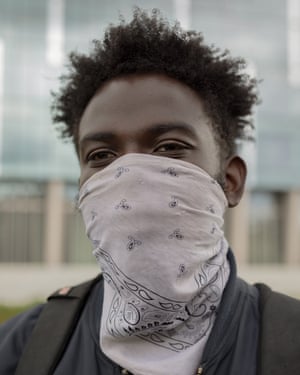
John, 24
Car mechanic
I became politicised at a really young age, probably when I was four. I was leaving a shop and security stopped me and my mum. The woman pulled out a scanner and started scanning me from head to toe. My mum gave her an earful, but that’s when I realised that I looked different, that I was a target. They automatically assumed that I’d stolen something when I hadn’t.
It was an important point in my life. It’s the same issue trying to get a job. Even with mechanic shops all around London, it’s harder for black people to get picked for a job in some of these places. The mechanic would rather take the white boy and not give me a shot. Enough is enough. My children aren’t going to go through similar racist experiences. If I’ve got to be out here every single day, I will be.
Police brutality is a strong issue here in the UK too. During the coronavirus pandemic, police started coming round my area and black boys like me were getting stopped. Their excuses are we look like we’re trying to steal something. They are stopping me in front of the building I live in, putting me in cuffs, embarrassing me in front of everyone. You’re putting your hands on my parts for what? Just to feel power that you can abuse? These things need to stop. There are so many young black people here, outside the American embassy, because we all feel it.
There has never been a time when I’ve felt I can call the police: they’re more likely to suspect me than actually help.
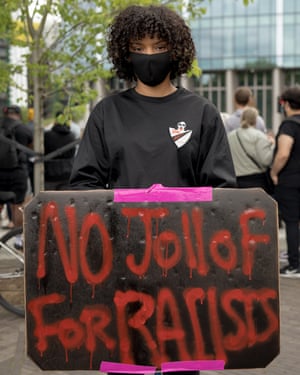
Chioma Atuanya, 22
Former recruitment consultant
I realised there was institutional racism in the UK when I was 15. My dad lives in Nigeria and he said he knew someone who had died of Ebola. Everyone at school was making jokes, whereas I was worried for my father’s safety. I told people that it wasn’t cool and that they had to stop because what if I made a joke about cancer?
Everyone started kicking off. Someone made a racist comment towards me and my mum got called into school. Not because of what they said, but because of what I said. They said I needed to stop talking about controversial subjects at school or I would be excluded. It was probably the first time I had a proper conversation about racism with my mum. I thought the teachers would be more understanding, but nothing happened.
Since then, I realised it’s a lot bigger than I first thought. George Floyd isn’t the first man to die at the hands of racism, but there is such a hype right now, we need to jump on it. These are innocent people who are not sick and they are dying anyway. People are just taking lives here.
The presence of social media has blown up the issue. There is a large black community online sharing everything, and it has brought it to everyone’s attention. There is no shadow of a doubt what’s happening and now everyone is wising up to previous things when excuses were made. Everyone is seeing it’s all just smoke.
Aima, 18
Student and co-organiser of the London Black Lives Matter group LDN BLM
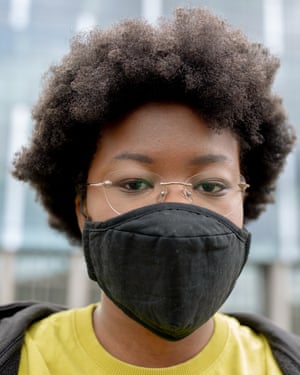
I’ve grown up with so many videos of police brutality; videos from the US, UK and all over the world. It has affected me quite badly. It’s been 10 years of watching people die online that has driven me to being so angry and wanting my voice to be heard.
When I moved to the UK from Nigeria in 2012, I saw so much that I have never seen before. Seeing and hearing my friends talk about stop and searches has really affected me. There was a lot of racism in school; other students calling me the N-word, calling me a monkey. I’m here today because I stand in solidarity with all my US brothers and sisters. Enough is enough; black people cannot keep suffering.
Racism doesn’t just happen in the US; it also happens here and that’s why we’re fighting. We need to realise that so many people have been harassed and assaulted by the British police. I’m tired because systematic racism within the police system has been going on for years. Just because it’s not talked about much doesn’t mean it’s not happening. We want people to be educated and to hear us. That is the main thing – hear our voices. I think marching has made a huge difference because everyone is speaking about the issue.
Natasha, 21
Student, co-organiser of LDN BLM
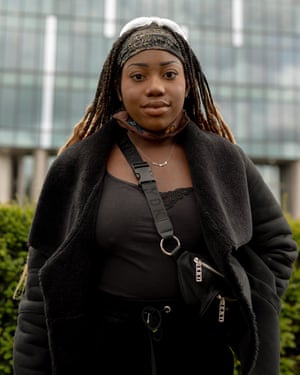
George Floyd’s death was the catalyst for everything. Black Lives Matter has resonated so deeply in the UK because the black community and other people of colour know what racism is like in this country. I think they all had a “this could be me” or “this could happen to someone I know” moment. This is a sign of real change and people want things to be different.
I’m here to call for justice for Grenfell. There are residents who still don’t have housing. It was a tragedy. We want change and we want our voices to be heard. I cannot believe that in 2020, and even though we are facing a global pandemic, we still have to come out and protest for our civil rights and for our lives.
You can’t tell the oppressed how to feel. I hope that we can start to see some reform.
Zoje Aig, 25
Creative writing graduate
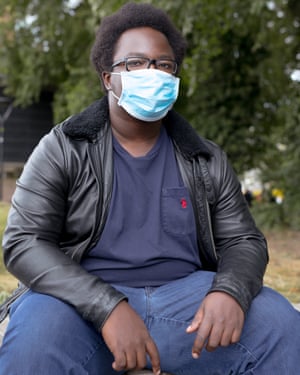
What happened at Saturday’s Black Lives Matter protests, when police horses charged at protesters and how things escalated from there, is part of the reason why I’ve come back here today. We aren’t all that dissimilar to America. It’s ignorant to think there isn’t racism in the UK. There is racism here, there is racism practically everywhere, even in Africa, where nearly everyone is black. You have to educate yourself; look around you and look online.
I’m sure there are plenty of places that can tell you just how racist the system is. For me, racism in the UK was people in school making fun of your accent, people in restaurants wondering why you’re not speaking English, people telling me they can’t pronounce my name and asking whether I’d prefer to be called John or Jack. It’s wondering why they can’t spell my last name, yet they can easily pronounce names like Schwarzenegger.
Ruth Ngombo, 24
Student nurse
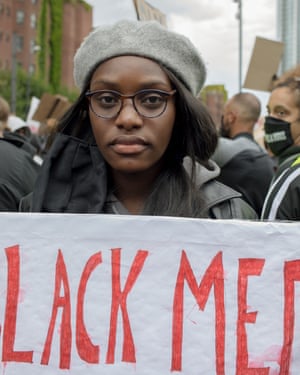
It started when I was in secondary school. I came in for my first day, feeling great. My mum did my hair in little bobbles and plaits. The head of year seven, who was a white woman, shouted at me within moments of me entering the school. She said that my hair was not acceptable. She told me to remove it all. I was 11. I went to the toilet and cried. I wondered what I was supposed to do. The teacher would rather I looked like a fool and had my hair out than how it was. I just didn’t agree with that.
From that moment, it kind of shifted everything else for me. White teachers would say things like, “You’re acting a bit ghetto,” and I would think how is this allowed? I’m here today for black women. We hear about what happens to black men in cases of police brutality, but it’s black women that we don’t really hear that much about. And, unfortunately, with black women who have been killed due to racism, nothing really happens.
I felt like I needed to say something because it could be me. It could be any black woman and nobody would know our names. Black men, it’s also your job to help take care and protect our black women. We are the ones who are going to provide the future.


